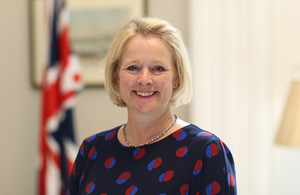UK Government Minister for Scotland Malcolm Offord has today made his maiden speech in the House of Lords.
Minister Offord was invited to speak at the end of a debate from from Baroness Jones of Moulescoomb.
The question was posed to ask the UK Government what steps they have taken to ensure that subsidies and licensing decisions related to the oil and gas industry are not subject to undue influence from outside interests.
An excerpt from Lord Offord’s response follows:
My Lords, it is a great honour to make the final contribution to this short debate as a newly appointed Parliamentary Under Secretary of State for Scotland, making my maiden speech today in your Lordships’ House.
Please allow me to start by thanking your Noble Lords for the warm welcome you have extended to me in this House, to my supporters, my noble friends The Lord Kirkham and Lord Forsyth of Drumlean, and to Black Rod, the Clerk of the Parliaments and especially the Doorkeepers who exercise great patience as I wander around in circles.
I should also give special thanks to my noble friend and mentor Lord Leigh of Hurley and my noble friend and whip Lord Younger of Leckie for sharing their invaluable knowledge of the workings of your Lordships’ House.
My Lords, before turning to the substance of the important question posed today by Baroness Jones, may I crave your indulgence with some personal remarks. I was born in a modest but homely tenement at 33 Bank Street in Greenock, an industrial town west of Glasgow on the Firth of Clyde.
I was educated at my local schools Ardgowan Primary and Greenock Academy and, my Lords, what a first-class education I received for free. I’m not the first alumnus of that school to be associated with this House: my noble friend Baroness Goldie of Bishopton served as a distinguished Head Girl of Greenock Academy as did the wife of my noble friend Lord Leigh of Hurley.
I was dismayed when my old school was closed in 2011 having been founded in 1855. It was determined by the local council that, with Inverclyde de-populating post-deindustrialisation requiring the local schools to reduce from eight to six, Greenock Academy should be closed because it conferred too great an advantage on the students who were fortunate enough to study there.
Surely, an egregious example of levelling-down in Scotland, and a personal motivator for me in joining this government’s levelling up agenda.
So why Lord Offord of Garvel? If you walk down Bank Street past the Wellpark to my parish church the mighty Mid Kirk, and cross the road to the magnificent Georgian Customs House on the Clyde, and then turn right along the river bank, you will come to Garvel Point.
Garvel has long been a landmark in Greenock because it is where the deep water is located and it was originally a safe harbour for the fishing fleets before the first industrial revolution transformed the town into a thriving trading port and shipbuilding hub.
Greenock’s most famous son is the inventor and engineer James Watt and the dock which bears his name remains in use today at Garvel Point. In fact, two of the three dry docks on the Clyde were located at Garvel and a recent renovation project has re-purposed one into the award-winning Beacon Theatre.
Which brings me neatly to the question before the House today. Because one of my first ministerial duties was to participate in COP26 in Glasgow, and how fitting that the world came back to the Clyde to seek new solutions for this climate emergency. What a tremendous achievement for the UK’s two-year presidency to increase the global commitment to net zero from 30 per cent to 90 per cent of world emissions.
Some say that the UK has a limited role to play in climate change as we account for only 1 per cent of world emissions. Yet COP26 proved our leadership still counts as we show it is possible to simultaneously grow our economy whilst cutting our emissions.
My Lords, this is what I learned at COP26: that we have the capital, the brains and the political will to meet the climate challenge. Participating as I did in the Net Zero Technology forum (funded by the Aberdeen City Deal), I was so encouraged to hear technologists from the oil and gas sector in Aberdeen collaborating with Houston, Calgary, Perth and Canberra as they re-purpose their assets and people into low carbon energy sources. And how gratifying that Scotland has such a prominent and world leading role to play in re-balancing the UK’s energy programme to net zero by 2050.
We have all the natural resources, the existing infrastructure plus the scientists, engineers and skilled workforce required to build a balanced score-card in Energy. Scotland contributes 60 per cent of the UK wind generation plus 40 per cent of the 160,000 highly skilled jobs already working in Energy across the UK. This is called punching above our weight in a United Kingdom where we contribute just 8 per cent of the population but 33 per cent of the geography.
However, my Lords, we must remember that a key word in this climate debate is “transition” and that it’s to net zero not to zero carbon. With 35 per cent of the UK’s Energy needs in 2050 still coming from carbon (halved from 75 per cent today), we would be foolhardy and irresponsible to ditch our world-class oil and gas sector in the North Sea to then increase our carbon footprint by importing inefficiently from Russia and Qatar.
The North Sea Transition Deal is an exemplar in the G7 of an industry working in partnership with Government to ensure net zero is met by 2050. By 2030, the cashflow generated in oil and gas will contribute £15bn long term investment into renewables. And by 2030, the UK offshore energy sector will support 200,000 high-quality jobs of which two thirds will be in low carbon.
My Lords, to answer the Question, in short, the UK Government does not give subsidies to fossil fuel companies and licences are awarded by an independent regulator Oil & Gas Authority (OGA) within the framework of achieving net zero by 2050. In fact, the High Court on Tuesday dismissed a case brought by climate activists against the regulator, rejecting their argument that the OGA’s actions amount to a type of unlawful subsidy of the fossil fuel sector.
Licensing decisions are made by OGA which is an independent regulator. Their staff are classified as public servants and are subject to rigorous standards and codes of conduct.
My Lords, in closing this debate, may I be quite clear that HMG does not believe that decarbonising our economy means shutting down the oil and gas industry as soon as possible.
A broad range of stakeholders from entrepreneur Sir Ian Wood to the GMB trade union have warned politicians against creating an adverse investment environment for this vital sector. There is nothing fair or just about that and it will set us back on the road to net zero.

